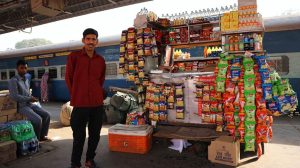People of Bharat: Yogesh, Lucknow

The platform at the Lucknow railway station is like any other; the hustle and bustle of passengers compounded by the coming and going trains. I make my way to a shop selling dairy products and refreshments at the platform. This shop; the only one at the platform — is a local chain of stores which sells packaged milk and other dairy products such as buttermilk, curd, sweets; besides savories and other light snacks. It is manned by Yogesh; a tall, slightly stout man in his early thirties, a native of Lucknow city. I have to wait my turn to speak to Yogesh — there are many customers at his shop; the rising temperatures driving them for a drink of cold lassi (sweetened buttermilk) or a snack. As the train’s horn echoes, his customers quickly make payments and hurry back to the train — leaving me time to chat with Yogesh.
Yogesh tells me he resides in Mehendiganj in Lucknow. He lives with his extended family of eight members in a two-room house. His family consists of his parents, three siblings, his paternal uncle and aunt. The house is fitted with a gas connection, television, and refrigerator. Yogesh own a motorcycle which he rides to work every day.
Yogesh’s father runs a rewari shop in the old city parts — the rewaris are made at home and then taken to the shop to be sold. Yogesh has three other siblings; an elder brother and two younger sisters. Yogesh knows his father has no fixed income but remembers how his father always prioritised their education. I internally wince as I learn Yogesh holds Bachelor’s degree from Kanpur University and a Master’s degree from a college in Faizabad. He reads me as he comments ‘hum itna padh ke bhi dukaan chala rahein hai.’ (In spite of being so educated, I am running a shop).
Yogesh tells me about his struggle in finding a suitable job. He spent almost ten years juggling between colleges and doing odd jobs. He recalls his stint at a bookstore in Kanpur and his love for reading. ‘I am very fond of reading; in that bookstore (I got the opportunity) to read a lot.’ He completed his Master’s degree but still couldn’t land a decent position. He even worked as a waiter before giving it up to join this shop a year ago; before him, his brother used to man this store. He compares himself with his brother who never completed his graduation yet runs multiple shops in the old city.
Yogesh opens the refrigerator door to let me have a peek and offers me a packet of buttermilk. ‘Itni garmi me yahi zyada bikta hai’ (In such hot weather, this sells the most). The shop is leased out to the dairy chain by the Indian railways. Yogesh is not a regular employee of the chain and gets paid an amount daily for selling fixed number of items. If he manages to sell more, he gets paid accordingly. Yogesh makes around Rs. 4000–5000 every month of which he spends Rs. 1000 over petrol and other personal expenses. His father looks after the expenses towards groceries (costing around Rs. 3000) while his brother and he manage bill payments. Sometimes, he spends Rs. 500–700 on medicines. He hints towards ongoing health-related issues in his family. Both his parents suffer from diabetes and his younger sister recently fell ill with typhoid. ‘My sister has delicate health. It has increased ever since she recovered from typhoid. She is getting leaner day-by-day’; says Yogesh in a low voice. ‘Kaam karti hai phir bhi. Receptionist hai’ (She still insists on working. She is a receptionist).
A year ago the older one of Yogesh’s two sisters got married. The family spent their significant savings for the wedding and cut down on expenses: ‘We used to eat only one meal so that the maximum could be saved for her wedding expenses’. Alluding to the patriarchal Indian culture, he remarks, how despite belonging to a similar economic and social background, the groom’s family expects to be treated as ‘high status’. Yogesh’s father borrowed large sums of money from his friends and relatives to get all the rituals done right. ‘Papa kush the ki shaadi acche se hui’ (father was happy that everything went well with the wedding). Yogesh is able to save Rs. 1500 to 2000 every month; he feels being single has its financial advantages. He owns a smartphone and uses it for messaging, taking pictures and making/receiving payments through e-wallet. He is judicial with his e-wallet payments, preferring never to make big payments online.
I get distracted as a large parcel of packaged chips arrives. It’s a delivery from the main branch to replenish the shop’s supply. Yogesh sits down and starts counting the stock. ‘Yahan se nikalna chahta hoon par nikalne me dar bhi lagta hai’ (I want to get out of here, but I also feel scared). ‘I keep applying to government jobs but looking at the competition I see nothing getting better for me’, he says with a sigh. At night Yogesh teaches the children of sweepers that clean the platforms: ‘yahin dukaan ke bahar raat me padha deta hoon. Kar ke accha lagta hai’ (I teach them right outside the shop at night. It feels good). Yogesh feels the poor have fewer opportunities to rise: ‘yojanaye aati hai, labh kahan milta hai sabhko?’ (Schemes are launched but who is benefitted?).
I ask Yogesh about his plans for the future. He promptly answers, ‘ummeed nahi chodna hai. Naukri kahin achi milegi toh zaroor jaunga’ (I won’t let go of hope. If I get a good job, I will surely go for it). He blushes when he tells me he wishes to get married someday. ‘I desire to educate my kids in the best schools and colleges so that he would never face the job scarcity so harshly’. He perks up as an announcement informs of a four-hour delay in the arrival of one of the trains. ‘Dugna kamai ho jayega’ (I will earn double) he smiles as the announcement concludes: ‘Inconvenience caused to passengers is deeply regretted.’
This research was developed as part of the Bharat Inclusion Initiative.
